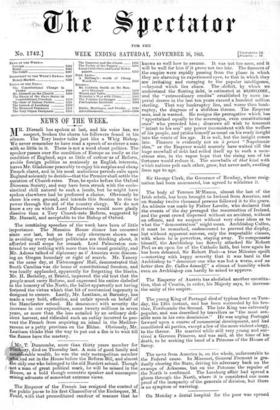Tile Emperor of the French has resigned the control of
the public purse to his first Chancellor of the Exchequer, M. Fould, with that premeditated candour of manner that he knows so well how to assume. It was not too soon, and it will be well for him if it prove not too late. The finances of the empire were rapidly passing from the phase in which they are alarming to experienced eyes, to that in which they are irritating and enraging to the popular intelligence, —beyond which lies chaos. The deficit, by which we understand the floating debt, is estimated at 40,000,0001., and the "extraordinary credits" established by mere im- perial decree in the last ten years exceed a hundred million sterling. That way bankruptcy lies, and worse than bank- ruptcy, the disgrace of a shiftless throne. The Emperor sees, and is warned. He resigns the prerogative which has "appertained equally to the sovereigns, even constitutional ones" who preceded him ; disavows all wish to transmit " intact to his son" any power inconsistent with the welfare of his people, and prides himself as usual on his ready insight into the wants of his age. It is well, but the insight comes late. Finance is evidently not an a priori "Napoleonic idea," or the Emperor would scarcely have waited till the huge snowball of debt had rolled itself up to such a mon- strous size, in the vague hope that the rising sun of his fortunes would reduce it. The snowballs of that kind with which nations pelt each other, grow, but never melt, swelling from age to age.






























